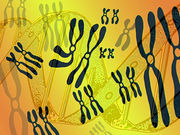Kids with CYPC19*17 alleles without corresponding loss-of-function alleles have longer times with pH <4
TUESDAY, Sept. 26, 2017 (HealthDay News) — Children with CYP2C19*17 alleles without corresponding loss-of-function alleles have longer times with pH <4 in response to proton pump inhibitor (PPI) medication, according to a study published online Sept. 8 in the Journal of Clinical Pharmacology.
James P. Franciosi, M.D., Ph.D., from the Nemours Children’s Hospital in Orlando, Fla., and colleagues examined whether pH probe acid exposure outcomes are associated with CYP2C19*17 alleles among children with clinical concern for gastroesophageal reflux. A retrospective cohort of 74 children with stored endoscopic tissue samples were identified; they had also undergone esophageal pH testing while on PPI therapy. After genotyping, these individuals were dichotomized to CYP2C19*17 allelic carriers without corresponding loss-of-function alleles as cases, versus controls.
The researchers found that children who carry CPY2C19*17 alleles without corresponding loss-of-function alleles demonstrated significantly longer times with pH <4 compared to controls (76.46 versus 33.47 minutes; P = 0.03); they also had a higher percent of time with pH <4 (5.71 versus 2.67 minutes; P = 0.04). Using multiple-regression modeling with test duration, PPI dose, and race as confounding variables, these findings remained statistically significant.
“We conclude that the CYP2C19*17 allele may influence response to PPI medication therapy in children, and PPI therapy may be better optimized with genotype-guided dosing,” the authors write.
Copyright © 2017 HealthDay. All rights reserved.








